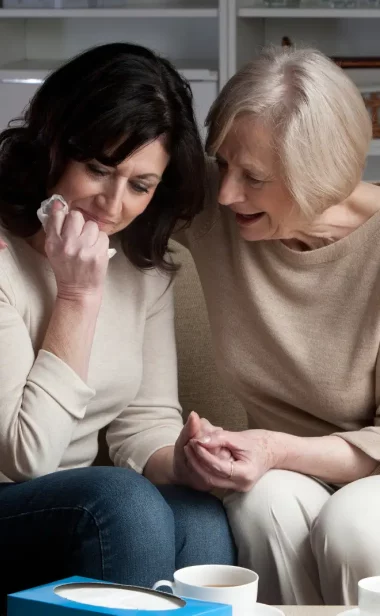My Services
Feelings of stress or anxiety
Feeling overwhelmed? Counselling can help you manage stress and anxiety through various techniques and help you to identify triggers, cope with stress, and improve your overall well-being.
We can work together to:
- Identify and manage stress triggers
- Explore the root causes of your stress
- Develop effective coping mechanisms
- Challenge negative thoughts and beliefs
- Develop healthy habits to improve energy levels and reduce stress.
- Build resilience: Develop the skills to bounce back from challenges.

By addressing the underlying causes of your stress and anxiety, we can work together to improve your mental health and overall quality of life.
Panic attacks
Panic attacks can be frightening, but counselling can help you understand and manage them.
Through therapy, you will learn coping strategies to reduce the frequency and intensity of panic attacks. You will also explore the underlying causes of panic attacks and develop tools to challenge negative thoughts and beliefs.
We can work together to:
- Understand the physical symptoms of a panic attack: Learn to recognise the signs and symptoms of a panic attack
- Develop effective coping strategies: Learn techniques to manage panic symptoms.
- Challenge negative thoughts and beliefs: Identify and challenge negative thought patterns that contribute to panic attacks.
- Explore the underlying causes of panic attacks: Understand the root causes of your panic attacks, such as stress, trauma, or anxiety disorders.

By addressing the underlying causes of your stress and anxiety, we can work together to improve your mental health and overall quality of life.
Grief, Loss, or Bereavement
Grief can be a painful process. Counselling provides a safe space to express your emotions, process your loss, and find meaning in your grief.
You will develop coping strategies and explore different stages of grief, acceptance, and finding new meaning and purpose.
We can work together to:
- Process your emotions: Express your feelings openly and honestly, without judgment or shame.
- Understand the stages of grief: Learn about the different stages of grief and how to navigate them.
- Develop healthy coping mechanisms: Learn techniques like mindfulness, meditation, and journaling to manage grief and anxiety.
- Find meaning in your loss: Explore the significance of your loved one's life and how their memory can continue to inspire you.
- Rebuild your life: Set realistic goals, develop new routines, and find new sources of joy and meaning.

By addressing the root causes of relationship problems and developing healthy communication and conflict resolution skills, you can strengthen your bond and create a more fulfilling partnership.
Relationship Problems
Struggling in your relationship? Counselling can help you improve communication, resolve conflicts, and strengthen your bond. You will learn to express your needs, listen actively, and work together to overcome challenges. You may also explore attachment styles, intimacy issues, and ways to build trust and understanding.
We can work together to:
- Improve communication skills: Learn effective communication techniques, such as active listening, assertive communication, and non-verbal communication.
- Resolve conflicts: Develop healthy conflict resolution strategies, including compromise and negotiation.
- Enhance intimacy and connection: Explore ways to deepen your emotional connection, improve physical intimacy, and strengthen your bond.
- Address underlying issues: Identify and address underlying issues, such as past traumas, unmet needs, or differing expectations.
- Build trust and forgiveness: Understand how to rebuild trust, forgive past mistakes, and move forward in your relationship.

By working through the grieving process with a trained counsellor, you can find healing, hope, and a renewed sense of purpose.
Problems with Addiction
Addiction can be a challenging issue. Counselling can help you understand the underlying causes of addiction, develop coping mechanisms, and support your recovery journey. You will learn to identify triggers and build healthy habits and explore the impact of addiction on relationships, work, and overall well-being.
We can work together to:
- Identify the root causes of addiction: Explore the underlying psychological, emotional, and social factors contributing to your addiction.
- Develop effective coping mechanisms: Learn strategies to manage cravings, reduce stress, and avoid relapse.
- Build a strong support network: Connect with supportive friends, family, and recovery groups.
- Address underlying mental health issues: Identify and address any underlying mental health conditions, such as depression or anxiety.
- Learn healthy lifestyle habits: Develop healthy habits, such as regular exercise, a balanced diet, and adequate sleep.
- Rebuild relationships: Learn to build healthy, supportive connections.

By addressing the root causes of addiction and developing a comprehensive recovery plan, you can overcome any challenges.
Trauma and Post-Traumatic Stress
Trauma can have lasting effects. Counselling helps you process traumatic experiences, develop coping mechanisms, and reduce symptoms of PTSD. You'll learn to manage anxiety, flashbacks, and nightmares, and rebuild a sense of safety and security.
We can work together to:
- Process traumatic experiences: Use therapeutic techniques, to process traumatic memories and reduce their emotional impact.
- Develop healthy coping mechanisms: Learn strategies to manage anxiety, stress, and negative emotions.
- Rebuild a sense of safety and security: Develop healthy boundaries, trust, and self-care practices.
- Improve sleep quality: Address sleep disturbances, such as insomnia and nightmares.
- Enhance relationships: Improve communication, trust, and intimacy with loved ones.
- Find meaning and purpose: Explore the impact of trauma on your life and find ways to move forward with hope and resilience.

By addressing the root causes of trauma and PTSD, you can heal from the past and build a brighter future.
Abuse
Abuse can be a devastating experience. Counselling provides a safe and supportive environment to heal from abuse, address its impact, and develop healthy coping strategies and relationships.
We can work together to:
- Process the trauma: Use therapeutic techniques to process traumatic memories and reduce their emotional impact.
- Rebuild self-esteem: Challenge negative self-beliefs and develop a positive self-image.
- Develop healthy boundaries: Learn to set and maintain healthy boundaries in your relationships.
- Improve communication skills: Develop effective communication skills to express your needs and feelings.
- Build trust: Learn to trust yourself and others, and to recognise signs of healthy and unhealthy relationships.
- Find support: Connect with support groups and other survivors of abuse.

By addressing the impact of abuse and developing healthy coping mechanisms, you can heal from the past and build a fulfilling future.
Depression
Depression can affect your mood, energy, and overall well-being. Counselling can help you manage symptoms of depression, improve your mood, and increase motivation. You will learn to challenge negative thoughts, develop positive coping mechanisms, and build resilience.
We can work together to:
- Identify and manage symptoms: Learn to recognise the signs and symptoms of depression, such as persistent sadness, loss of interest, fatigue, and changes in appetite and sleep patterns.
- Challenge negative thoughts: Develop cognitive-behavioural techniques to identify and challenge negative thought patterns.
- Improve mood and motivation: Learn strategies to boost your mood and increase your motivation
- Build self-esteem and confidence: Develop a positive self-image and learn to value your strengths.
- Develop healthy coping mechanisms: Learn techniques to manage stress and anxiety.

By addressing the underlying causes of depression and developing effective coping strategies, you can improve your mental health and overall quality of life.
Problems with Confidence or Self-Esteem
Struggling with self-doubt? Counselling can help you challenge negative self-beliefs, build self-confidence, and develop a healthier self-image. You will learn to embrace your strengths, overcome self-criticism, and live a more fulfilling life. You may also explore the roots of low self-esteem, the impact of social comparison, and ways to develop a positive self-image.
We can work together to:
- Identify the root causes of low self-esteem: Explore past experiences, negative beliefs, and social comparisons that may be contributing to your self-doubt.
- Challenge negative self-talk: Learn to identify and challenge negative thoughts and replace them with positive affirmations.
- Set realistic goals: Break down large goals into smaller, achievable steps to build confidence and momentum.
- Practice self-compassion: Learn to be kind and understanding to yourself, just as you would be to a friend.
- Build social connections: Develop strong, supportive relationships with others.
- Engage in activities you enjoy: Pursue hobbies and interests that bring you joy and fulfilment.

By addressing the root causes of low self-esteem and developing positive self-beliefs, you can build confidence, embrace your strengths, and live a more fulfilling life.
Anger Management
Anger can be a powerful emotion. Counselling can help you understand and manage anger, improve communication, and reduce impulsive behaviour. You will learn to identify triggers, practice self-control, and resolve conflicts peacefully.
We can work together to:
- Identify anger triggers: Recognise the situations, thoughts, or feelings that trigger your anger.
- Develop healthy coping mechanisms: Learn techniques to manage anger.
- Improve communication skills: Practice assertive communication to express your feelings calmly and respectfully.
- Resolve conflicts peacefully: Develop effective conflict resolution strategies, such as active listening and compromise.
- Challenge negative thoughts: Identify and challenge negative thought patterns that contribute to anger.
- Practice self-care: Prioritise self-care activities, such as relaxation techniques and hobbies, to reduce stress and improve overall well-being.

By understanding the root causes of anger and developing effective coping strategies, you can manage your anger, improve your relationships, and reduce stress.
Issues Relating to Sexuality
Exploring your sexuality can be a complex journey. Counselling offers a safe space to explore sexual identity, orientation, and concerns. You'll learn to embrace your sexuality, build healthy relationships, and promote self-acceptance.
We can work together to:
- Explore your sexual identity and orientation: Understand your sexual identity and orientation without judgment or shame.
- Address sexual concerns: Discuss any concerns or questions you may have
- Improve communication with partners: Learn how to communicate effectively
- Develop healthy relationships: Build healthy, respectful, and consensual relationships.
- Address sexual trauma: Heal from past sexual trauma and build resilience.

By creating a safe and supportive space to explore your sexuality, we can work together to promote self-acceptance, improve relationships, and enhance your overall well-being.
Difficulties at Work or in Retirement
Work-related stress and retirement transitions can be challenging. Counselling can help you address work-related stress, career changes, retirement adjustment, and work-life balance. You'll learn to manage stress, set boundaries, and find fulfilment in your work or retirement.
We can work together to:
- Manage work-related stress: Develop effective stress management techniques
- Navigate career transitions: Explore career options
- Adjust to retirement: Cope with the challenges of retirement, such as loss of identity and purpose
- Improve work-life balance: Set healthy boundaries between work and personal life and prioritise self-care.
- Enhance job satisfaction: Identify your strengths and passions and find ways to align your work with your values.
- Address workplace conflicts: Develop effective communication and conflict resolution skills.

By addressing the challenges of work and retirement, you can find fulfilment, reduce stress, and improve your overall well-being.
Problems with Family
Family relationships can be complex. Counselling can improve family communication, resolve conflicts, and strengthen family bonds. You will learn to express your needs, listen actively, and work together to build a stronger family.
We can work together to:
- Improve communication: Learn to express your feelings and needs assertively and respectfully.
- Resolve conflicts: Develop effective conflict resolution strategies, such as active listening, compromise, and negotiation.
- Strengthen family bonds: Build stronger connections with family members through shared activities and open communication.
- Address generational trauma: Explore how past family trauma may be impacting current relationships.
- Set healthy boundaries: Learn to set and maintain healthy boundaries with family members.
- Manage family stress: Develop coping strategies to manage stress and anxiety within the family.

By addressing the root causes of family conflict and developing healthy communication skills, you can strengthen your family bonds and create a more harmonious and supportive family environment.
Issues in School
School can be a stressful time. Counselling can help students manage academic stress, social challenges, and emotional difficulties. You will learn to improve study habits, build social skills, and manage anxiety.
We can work together to:
- Manage academic stress: Learn techniques to reduce stress and anxiety.
- Build social skills: Develop effective communication skills, empathy, and assertiveness.
- Address bullying and peer pressure: Learn how to respond to bullying and peer pressure and build resilience.
- Cope with emotional difficulties: Learn to manage anxiety, depression, and other mental health challenges.
- Set academic and personal goals: Develop a clear vision to achieve your goals.

By addressing the challenges of school life, you can improve your academic performance, social skills, and overall well-being.
Get in touch
Feel free to contact me if you have any questions about how counselling works, or to arrange an initial appointment.
You can also call me on +350 5400 1041 if you would prefer to leave a message or speak to me first. I am happy to discuss any queries or questions you may have prior to arranging a session.
Please Note that if you want to cancel an appointment, I require 24 hours’ notice; otherwise, you will still need to pay for any sessions missed.
All enquires are usually answered within 24 hours, and all contact is strictly confidential and uses secure phone and email services.
Frequently asked questions
- Counseling is generally a shorter-term approach focused on addressing specific issues or problems. It's often goal-oriented, helping individuals find practical solutions and develop coping skills.
- Therapy is typically a longer-term process that explores deeper underlying issues and patterns of behaviour. It aims to promote personal growth and self-discovery.
Which is right for you? The best approach depends on your individual needs and goals. If you're dealing with a specific problem or looking for immediate solutions, counseling might be a good fit. If you're seeking to address deeper-rooted issues or explore personal growth, therapy may be more appropriate.
Remember: The most important factor is finding a practitioner who you feel comfortable with and who can provide the support you need.
There’s no fixed or ideal length of time for the counselling process; it varies from person to person and will often depend on the depth of the issues they are facing. While I can work on an open-ended basis with clients, I find it is helpful for us to both agree before we start on undertaking a certian nunebr of sessions and reviewing where we are at once we reach that point. You are able to decide how long your therapy willl last, and in return my aim is to make sure therapy continues for only as long as it is of benefit to you.
This depends on what your needs are. Some people find that after only a very few sessions they have some clarity and focus and are ready to end the therapy. Other people value the ongoing support and relationship with me and will continue to come for weeks, months, or even years. There is no 'one-size-fits-all' when it comes to therapy.
Generally, you can expect to schedule your initial appointment within 1-2 weeks. However, the exact wait time may vary depending on your availability and the specific type of counseling you need.
Yes, confidentiality is a fundamental principle of counseling. Unlike talking to friends or family, counseling offers a safe and private space to discuss your thoughts and feelings.
However, there are a few exceptions:
- Legal requirements: In certain situations, such as child protection concerns, I may be required to disclose information by law.
- Risk of harm: If you indicate that you are at risk of harming yourself or others, I may need to break confidentiality to ensure your safety.
It's important to note that breaking confidentiality is rare and only done in extreme circumstances.
By providing a safe and confidential environment, counseling can help you explore your thoughts and feelings without fear of judgment or consequences.
While it's understandable to want support from loved ones, it's generally best to attend counseling sessions alone. This allows for a more focused and open conversation between you and your counselor.
Here's why:
- Confidentiality: Counseling sessions are private and confidential. Having a friend or relative present can compromise this privacy.
- Focus: Your counselor can better address your specific needs and concerns when you're the primary focus of the session.
- Vulnerability: Counseling often involves exploring sensitive topics. Having a loved one present may make it difficult to be fully open and honest.
If you're feeling anxious or unsure about coming alone, please discuss your concerns with your counselor. They can provide support and reassurance.
